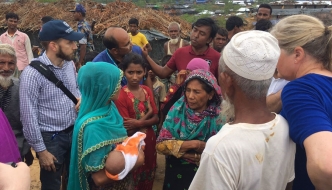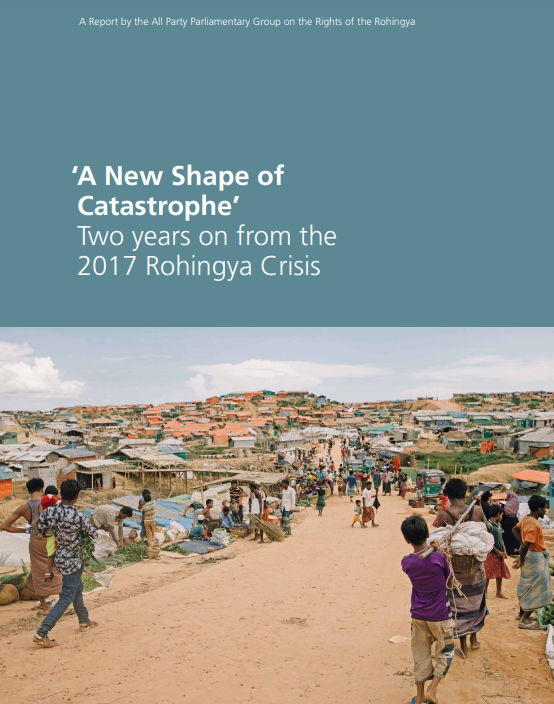Rohingya Inquiry
Anne Main MP will lead an inquiry into the Rohingya refugee crisis in Parliament as part of her role as Co-Chair of the APPG on the Rights of the Rohingya. This cross-party group was set up by Anne and Rushanara Ali MP (L, Bethnal Green and Bow) to represent the interests of the refugees in Parliament and to work to ensure this humanitarian crisis remains a priority for the UK government.
The report will be compiled following two evidence sessions held in Parliament and from various pieces of written evidence that will be submitted to the group too. Representatives from major NGO’s who are working on the ground in southern Bangladesh and other international agencies will give evidence to the MPs involved in the Rohingya report.
The first evidence session will focus on the humanitarian situation and the response to it, and will also cover how we can best respond to the protracted crisis. The second session will explore the issues of justice, accountability and durable solutions to the crisis. We will also hear evidence from the government on the UK’s response to the crisis.
The group would welcome anyone to submit evidence to the inquiry and to share their views on the crisis to the following email address Rohingyainqury@gmail.com
Please find full details of the Call for Evidence below:
Call for evidence - APPG on the Rights of the Rohingya inquiry: The Rohingya Crisis Two Years On
The APPG on the Rights of the Rohingya is launching a wide-ranging inquiry into the Rohingya crisis for a report to be released in August 2019, marking the second anniversary of the exodus of more than 700,000 Rohingya refugees from Myanmar to Bangladesh.
- Scope of the inquiry
From August 2017, over 700,000 Rohingya people from Myanmar fled to Bangladesh following a brutal military campaign which a 2018 UN Fact Finding Mission described as constituting gross human rights violations and abuses that “undoubtedly amount to the gravest crimes under international law.”[i] The Government of Bangladesh has demonstrated enormous generosity in keeping its borders open to hundreds of thousands of refugees. Nevertheless, Rohingya refugees in Bangladesh continue to face significant protection risks in refugee camps and uncertainty over their future. On the other side of the border in Myanmar, the Rohingya people continue to face conditions of systemic segregation and discrimination, as well as ongoing violence, which undermines the prospect of safe, voluntary, dignified and sustainable returns.
The report will take a broad look at the experience of the Rohingya in Bangladesh and Myanmar, and the key humanitarian, development, economic and political challenges posed by the crisis. It will review the UK Government and international community’s efforts to respond to the needs of the Rohingya and host communities in Bangladesh, and to support the creation of conditions for safe return to Myanmar.
- Send in your views
The APPG welcomes written submissions of no more than 3,000 words on some or all of the following topics. Note: you do not need to provide answers to every question.
The humanitarian situation in Bangladesh and Myanmar
● What is the current humanitarian situation for the Rohingya 1) in Bangladesh and 2) in Myanmar?
● How effective has the UK's response been in contributing to efforts to address humanitarian needs in 1) in Bangladesh and 2) in Myanmar?
● Does the 2019 Joint-Response Plan for the Rohingya Humanitarian Crisis meet the needs of Rohingya and vulnerable host-communities in Bangladesh effectively? And in what areas could it be improved to meet those needs?
● Does the 2019 Humanitarian Response Plan meet the needs of Rohingya in Myanmar effectively? And in what areas could it be improved to meet those needs?
● How effectively does the international community's response meet the needs of Rohingya women and girls in 1) Bangladesh and 2) Myanmar? And in what areas could it be improved to meet those needs?
● How effectively does the international community’s response assist victims of gender-based violence in 1) Bangladesh and 2) Myanmar? What measures are being taken to mitigate against future abuses and what in the current response could be improved?
● What has been the impact of the crisis on vulnerable host communities in Bangladesh? What support is currently being provided to this community and what support should be provided in the future?
● What measures can be taken to protect boys and girls and prevent violations of their rights - both in Bangladesh and Myanmar?
Short and medium-term solutions for Rohingya in Bangladesh
● How will the protracted crisis in Bangladesh impact 1) Rohingya refugees and 2) the host community?
● What are the current barriers to delivering interventions that can support refugee self-reliance and mitigate the impact of a protracted crisis in Bangladesh on host and refugee populations?
● How should the UK support Bangladesh to respond to the protracted crisis in the medium term?
● What sectors and interventions should be prioritised in this protracted refugee response?
● What steps can be taken to support access to education and livelihood opportunities for Rohingya refugees in Bangladesh?
● How can the risks facing women and girls in the short and medium term in Bangladesh most effectively be addressed?
● How can the risks facing children in the short term and medium term in Bangladesh most effectively be addressed?
● How can the UK more effectively support women and girls’ access to essential services including 1) healthcare/maternal health 2) gender based violence preventions and response services and 3) access to justice?
● What opportunities are there for international burden sharing with the Government of Bangladesh? What role can regional actors play in addressing the impact of the crisis on Bangladesh? What can be learnt from previous examples of international burden sharing in protracted crises?
● How should the Global Compact on Refugees be applied to protracted crisis in Bangladesh?
Justice, accountability and durable solutions for Rohingya in Myanmar
● Why is accountability for crimes against the Rohingya important? What does accountability mean to affected communities?
● What more can the UK government do to enable international justice for crimes against the Rohingya, including through its role on the UN Security Council and bilateral relationship with Myanmar and regional leaders?
● What options exist to pursue international justice for crimes against the Rohingya? What non-judicial accountability options exist and how can the UK government enable those?
● What are/have been the barriers to justice?
● What are the necessary conditions for displaced Rohingya to return to their homes in Rakhine?
● What were the consequences of the repatriation 'exercise' conducted in Cox's Bazar in November 2018?
● What steps can international and regional actors take to support and encourage the Government of Myanmar to effectively implement the recommendations of the Advisory Commission on Rakhine State?
● How should the UK engage with the Government of Myanmar to ensure that the Government of Myanmar’s camp closure strategy results in tangible improvements for the wellbeing of encamped populations?
● How effective have sanctions been as a route to accountability?
● What other options are there for achieving accountability for human rights abuses in Myanmar?
● How can widespread violations of children's rights be addressed?
Please send your submissions to Rohingyainqury@gmail.com
Deadline for submissions is Monday 10 June at midday.

DISSOLUTION OF PARLIAMENT
Watch: Anne Main, chair of the All Party Parliamentary Group on Bangladesh, talks about the Rohingya crisis and urges support for @DECappeal pic.twitter.com/FFL0lq8O0A
— DFID (@DFID_UK) October 12, 2017

